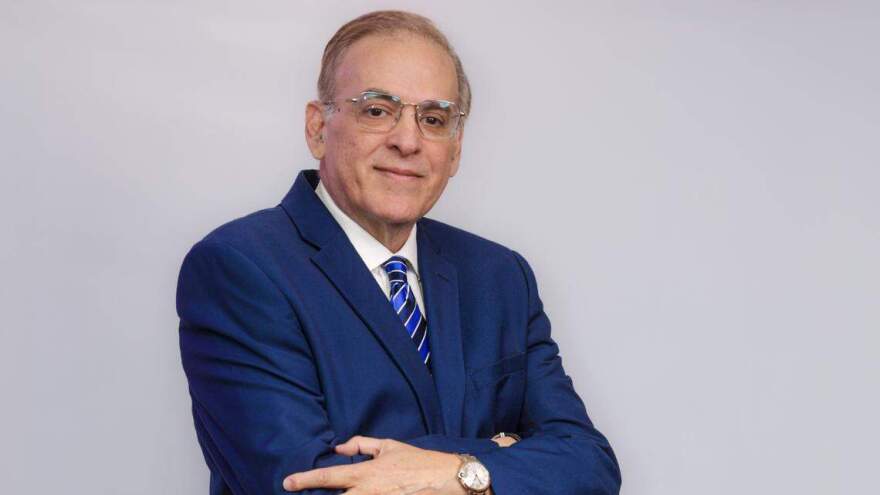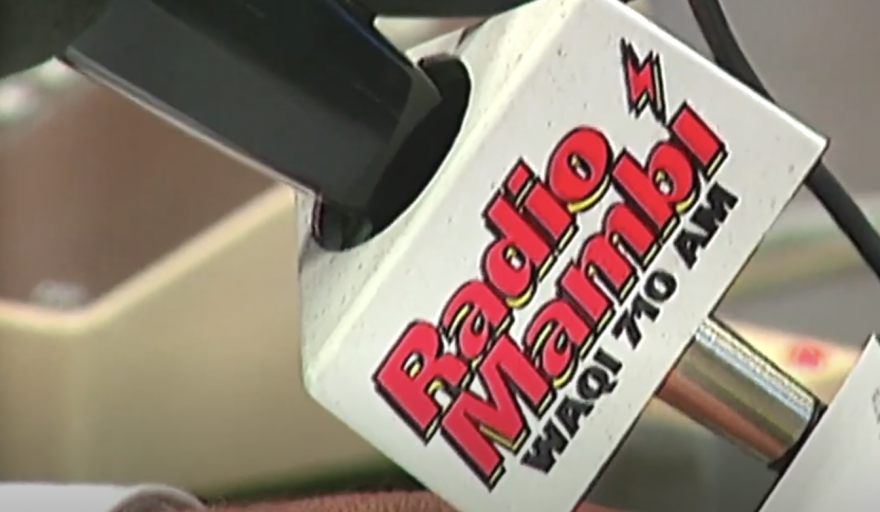Turn on Miami Spanish-language radio station WQBA, 1140 AM, and what you hear now is music.
Which is fine — except that a lot of folks in Miami had hoped instead to be hearing a new, less extremist information vibe on Spanish-language radio.
At the end of July, WQBA's news and talk show staff — including celebrity Latino broadcaster Oscar Haza — was let go. They’d been brought on last year by the station's new owner, the Santa Fe, N.M.-based Latino Media Network, to make its programming more politically moderate and journalistically fact-based.
“I was enthusiastic," the center-right Haza told WLRN.
"It was a really well-intentioned project and it was working. But curiously, in the end I had the impression there was no follow-up support, no aggressive marketing.”

That's because, say Latino Media Network sources, money to sustain that marketing and support effectively ran out.
Others, however, say there's more to the story than that.
It’s been three years since the bipartisan, Democrat-led investor group bought WQBA — then known as La Cubanísima, or Very Cuban — and another iconic station, Radio Mambí, WAQI, 710 AM, as part of a $60 million purchase of 18 Spanish-language outlets across the U.S.
At the time, both WQBA and WAQI often typified much of Miami’s Spanish-language news radio: right-wing anti-communist and notorious for misinformation.
Liberals and moderates hoped the Latino Media Network acquisitions — which initially set off panic in the more hardline conservative pockets of Miami's Cuban exile community — would lead to radio reform.
But today many say they’re disappointed — they argue, for example, the new programming format at WQBA (now known as El Pulso de Miami) was showing promise and deserved more time to gain traction.
"The Latino Media Network acquisitions [in Miami] can only be categorized as a spectacular failure," said Fernand Amandi, a Cuban-American Democrat who heads the Miami polling firm Bendixen & Amandi.
"Nothing was ever really done in earnest to change the tenor of the content and the discourse, which is what was promised," he said.
Critics like Amandi concede Latino Media Network — which counts liberal billionaire donor George Soros as one of its investors — did attempt to turn WQBA toward a more professional and less polarizing direction.
But, he says, not so at Radio Mambí.
“If anything. it went even worse.”
READ MORE: Mambí Mess: What does the sale of two iconic radio stations tell us about Miami?
Latino Media Network co-founder Stephanie Valencia disagrees — and told WLRN that the critics aren’t taking into account the financial and other challenges the project has faced since 2022.
“Latino Media Network is not immune to the economic headwinds the broader media industry is facing," said Valencia, who was a Latino outreach aide to former President Barack Obama.
"And those headwinds are disproportionately impacting the Spanish-language media environment, in particular on the [news] talk format."
"The economic headwinds the broader media industry is facing are disproportionately impacting the Spanish-language media environment."Latino Media Network co-founder Stephanie Valencia
Valencia was referring to the reality, which radio industry experts acknowledge, that the advertising revenue pie for Spanish-language AM radio in Miami is not as large as it was in years past — especially as younger listeners pivot to social media platforms.
The analysts also surmise that advertising for more moderate Spanish-language talk radio in Miami got tougher to sell after Republican President Donald Trump won re-election last fall — and carried Miami-Dade County.
But they also note complaints, which WLRN heard in off-the-record conversations, that more conservative holdover staff at WQBA and WAQI often worked to resist a more politically middle-of-the-road tone on issues like U.S.-Cuba relations.
Radio Mambí's ratings have outperformed WQBA's, according to the most recent Nielsen figures reported by the industry trade publication Radio Online. But critics question if that was sufficient reason to lay off WQBA's news staff — and they ask why Latino Media Network pursued less programming change at Mambí, and directed more resources to that station, at the expense of WQBA.
Valencia has long insisted Latino Media Network's aim was not to turn WQBA and Mambí from Republican mouthpieces into Democratic ones, but rather to bring "balanced journalism."
At the same time, she says, it’s unfair to suggest Mambí’s pre-2022 propensity for misinformation has been left unchecked.
“Mambí has been part of the media landscape for 50 years — but we have instituted standards and guidelines for differentiating opinion from fact, and to use credible sources," Valencia said.
"Enforcing these standards continues to be an ongoing process,. It's not something that can be fixed overnight," she said.

Even so, Latino media watchdogs — like a new, artificial intelligence-driven monitoring app called VERDAD, or “Truth” in Spanish — agree that Mambí still has a misinformation issue to fix.
Blind spot
“Monitoring Spanish-language and ethnic-language radio is difficult — it's a blind spot,” said Martina Guzman, an independent journalist at the Damon J. Keith Center for Civil Rights at Wayne State University Law School in Detroit.
With a grant and the help of AI developers in California, Guzman recently launched VERDAD — which translates Spanish- and other foreign-language radio misinformation into English text.
She pointed to one VERDAD clip from last month, for example, in which a Mambí talk show broadcast false conspiracy theories about the anti-COVID drug Remdesivir and the effects of COVID-19 vaccines on children — and questioned mainstream media for not giving them credence.
It was a reminder, Guzman said, that health misinformation is a special problem on Spanish-language radio.
“Latino people have a deep connection to radio compared to other communities," Guzman said.
"And so if the people speaking on the radio aren’t telling the truth, that is definitely going to impact how [Latinos] navigate really important things.”
"It's a failure. Nothing was ever really done in earnest to change the tenor of the stations' content and the discourse, which is what was promised."Fernand Amandi, President/CEO Bendixen & Amandi
That Latino affinity for Spanish-language radio is still strong — but media watchers say it's diminishing, especially among those younger Latinos,who are increasingly bilingual and moving to social media platforms like YouTube, Instagram and TikTok.
As a result, analysts like Florida International University political science professor Eduardo Gamarra say Latino Media Network may have misread Miami’s Latino media market when it purchased WQBA and Radio Mambí.
Because of the stations' popularity, “they assumed that they would have a captive audience — and they could, in fact, go in there and simply change the programming message," Gamarra said.
"But that was a long shot ... especially because they didn’t have a social media dimension to WQBA and to Mambí,” he said.
Latino Media Network says it’s assessing the stations’ futures, including that social media component.
As for the departed WQBA host Oscar Haza: he has a new show on América Radio, WSUA 1260 AM, and he says he’s continuing to push more moderate, fact-based fare.
“I still believe,” Haza said, “that we can do more professional Spanish-language radio here that’s not a pamphlet for the right or the left.”
"I too still believe in the important role radio plays in the Latino community," Valencia of Latino Media Network said.
"But it's also a business."






